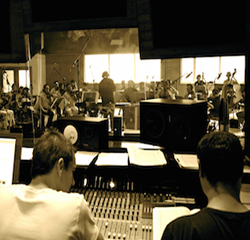
Additional Fees
There are other fees that must be paid under certain circumstances on a union date.
• The leader is always entitled to twice the scale rate regardless of what kind of session and which rate scale you’re using.
• If a musician doubles on a second instrument during the session, he will make an additional 20-30 percent (depending on the type of session and scale), and an extra 15-20 percent for each additional instrument played.
• And in some cases, he may even get an additional payment for cartage of large instruments like $12 for cello, baritone sax, bass sax, contra-bass clarinet, tuba, drums, marimba, chimes, accordion, Cordovox, and each amplifier, and $30 for harp, keyboard, tympani, vibraphone, and bass.
• Besides the hourly scale amount, the producer will also contribute another 12 percent or so to the musician’s union pension fund, an additional 3 percent to his health and welfare fund, and in some cases, 4 percent more to a vacation fund.
As stated before, the scales and rates are subject to change every few years, so it’s best to check with your union local to find out exactly what those rates are today. This section is only just a thumbnail of the detail as well, so check for all the particulars that might apply to your specific session well in advance of the downbeat, and make sure that the session leader or contractor (who files the paperwork) is on the same page as you.
Here’s a list of the major media center’s union locals and websites:
New York City Local 802
Los Angeles Local 47
Nashville Local 257
Chicago Local 10-208
Hiring Union Players
The best way to ensure that you get exactly the players you want, stay within the confines of the union, and have all the paperwork filed, is to hire a union contractor who will put the appropriate players together for you. If you need a horn or string section, a single call to a contractor will get you the players you need, instead of having to assemble the section yourself (which can be hit or miss as to the quality of players if you’re not familiar with them).
The contractor acts as a go-between for musicians and producers, and is required to be present at all times during the session when his contracted musicians are recording. Contractors come in two varieties: union and independent. Both are usually musicians themselves who supervise and provide additional services for a session.
A Contractor can help musicians and singers prepare by supplying them with the necessary information for the session, and making sure that they and their specified instruments and equipment arrive at the event or session on time. He coordinates the event, coaches, conducts, computes session fees, and submits the proper union forms (if it’s a union date) to the employer and union office.
It’s not uncommon for contractors to specialize in a specific area of the business like jingles, orchestral dates, or film/television sessions. For a contractor, it’s all about relationships. His or her reputation is founded on the experience level and quality of the musicians he or she makes available, so it really makes sense to cultivate relationships with the local contractors.
Bobby Owsinski is an author, producer, music industry veteran and technical consultant who has written numerous books covering all aspects of audio recording. For more information be sure to check out his website, and go here to acquire a copy of The Music Producer’s Handbook.
